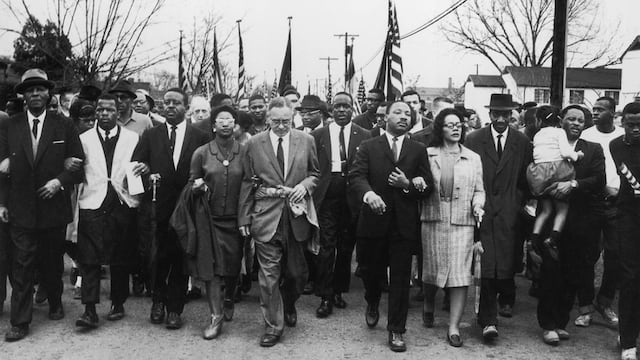The man behind Black History Month was a Harvard scholar who believed “all Americans should understand the largely overlooked achievements of Black Americans”.

Neither Martin Luther King Jr nor Malcolm X: This is the ‘Father of Black History Month’

Black History Month, which runs throughout February each year, was the brainchild of a Harvard-educated scholar who devoted his life and career to raising awareness of the achievements of African-Americans.
What is Black History Month?
Exhibitions, concerts, talks and a host of other events are being held across the U.S. this month, as part of a commemoration which, in the words of NPR’s Jonathan Franklin, “honors the contributions and sacrifices of African Americans who have helped shape the nation”.
Who founded Black History Month?
Initially only observed for a week-long period, the celebration was conceived exactly a century ago by the historian and author Carter G. Woodson (1875-1950), who has since become known as the ‘Father of Black History Month’.
Who was Carter G. Woodson?
The son of ex-slaves, Woodson was a historian who became only the second Black American to earn a PhD from Harvard University, before serving as the dean of the College of Arts and Sciences at Howard University.
The Virginia native is described by the National Association for the Advancement of Colored People (NAACP) as a man who “fervently believed that Black people should be proud of their heritage and all Americans should understand the largely overlooked achievements of Black Americans”.
Discussing the importance of ensuring widespread knowledge of the historical feats and contributions of African-Americans, Woodson told a speech in the 1920s: “We are going back to that beautiful history and it is going to inspire us to greater achievements.”
The author of numerous books on Black history, Woodson founded the Association for the Study of African American Life & History (ASALH) in 1915 - and, under his stewardship, the ASALH was behind the creation of the forerunner to Black History Month: Negro History Week.
🌟 Black History Month Spotlight: Carter G. Woodson 🌟
— West Virginia State University (@WVStateU) February 10, 2025
Known as the Father of Black History, WVSU alumnus Carter G. Woodson created Black History Month to honor the achievements of African Americans. 📚💛#BlackHistoryMonth #WVSUAlumni #CarterGWoodson pic.twitter.com/A6PpcLj0xv
Why is Black History Month held in February?
When it was established in 1926, Negro History Week was placed in February to coincide with the birthdays of two men who had played a major role in the abolition of slavery in the U.S.
As the ASALH explains in its history of Black History Month, Feb. 12 is the birthday of former U.S. president Abraham Lincoln - who signed the Emancipation Proclamation in 1863 - and Feb. 14 was the birthday chosen by the prominent abolitionist Frederick Douglass after his release from slavery.
The week-long celebration of Black history was extended to a month in 1976.
Per the U.S. government’s Black History Month website, then-president Gerald Ford called on the American people to “seize the opportunity to honor the too-often neglected accomplishments of black Americans in every area of endeavor throughout our history.”
Every year, Black History Month follows a particular theme. In 2026, to mark the 100th anniversary of the first Negro History Week, this theme will be: “A century of Black history commemorations”.
To find more information on this year’s program of activities, check out the ASALH website.
Related stories
Get your game on! Whether you’re into NFL touchdowns, NBA buzzer-beaters, world-class soccer goals, or MLB home runs, our app has it all.
Dive into live coverage, expert insights, breaking news, exclusive videos, and more – plus, stay updated on the latest in current affairs and entertainment. Download now for all-access coverage, right at your fingertips – anytime, anywhere.


Complete your personal details to comment